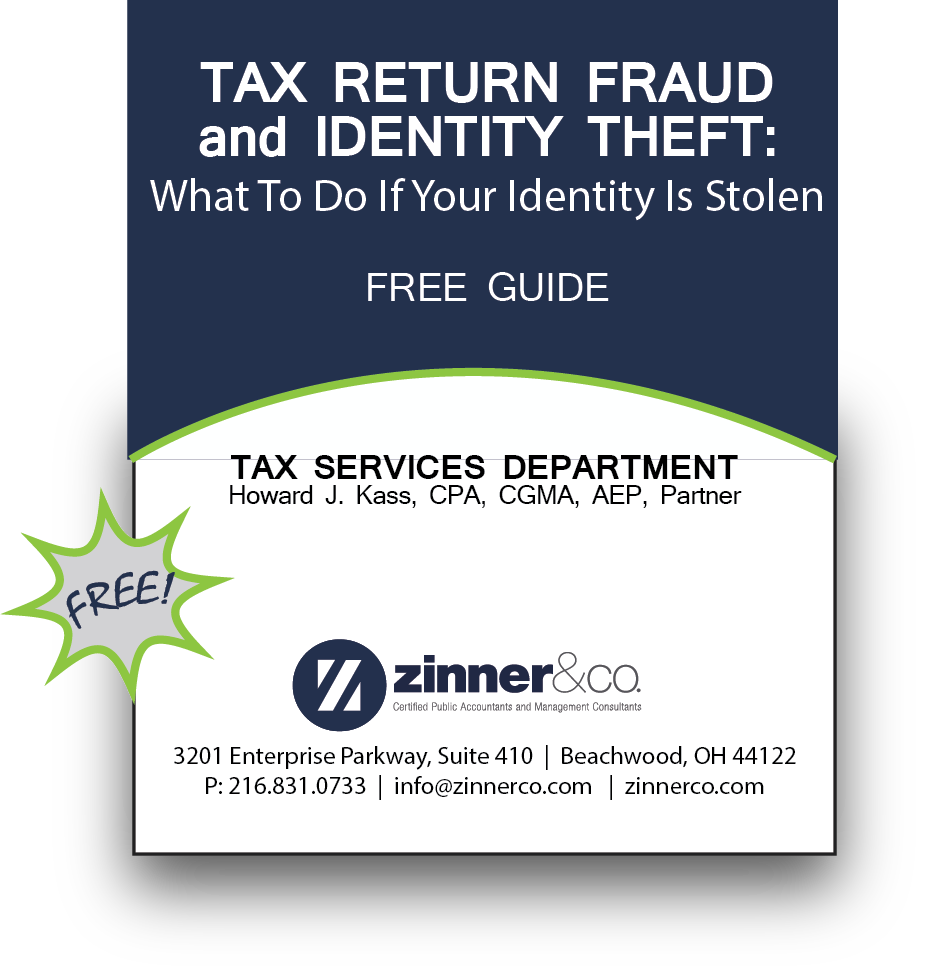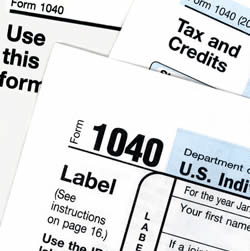You have read security warnings advising you to stay away from particular websites and of course, not to click on the link to become the beneficiary of a far-away royal.
You know not to download free apps, to stay clear of file sharing, and are current with anti-virus and firewall protection. Rightfully and confidently, you feel good about the protective steps you have taken to reduce your risk of identity theft. Then - WHAM! Along comes a hacker who successfully infiltrates some of the largest technology companies in the world and as a result, steals your email password.
Related read: Classic Hackers: What War Games taught us about technology in the workplace
I recently read the following news on Forbes.com:
New Survey: Half of Americans Expect Identity Theft to Cause Them a Financial Loss in the Next Year; Majority of Investment Frauds Go Unreported
Zinner & Co. identity theftAs management advisors, we strive to keep our readers informed, educated and in-step with the latest news surrounding business and personal cyber security. Knowlege is power -- and we are fortunate to receive many pieces of communication each day from credible agencies that help us guide you.
Today, we share insight from the AICPA’s National CPA Financial Literacy Commission's latest news.
ax-Related Identity Theft
First of a three part series
Classic Hackers: What War Games Taught us About Technology in the Workplace
Zinner & Co. fraud , security , technology , cybersecurityClassic Hackers: What War Games Taught us About Technology in the Workplace
If you have come to the realization that you forgot to include an item of income, deduction, credit, etc. from the tax return that you have already filed, you may still have time to make a correction by amending your tax return.
Generally speaking, you have three years to correct (or “amend”) your Form 1040, by filing Form 1040X. If you also file a state tax return, you may (or may not) also have to file an amended return as well.
According to the IRS, you can fix mistakes or omissions on your tax return by filing an amended tax return. If you need to file one, these tips can help.
Monday, April 18, was the tax deadline for most people in 2016. If you didn’t file a tax return or an extension to file but should have, take action now.
If you missed the tax filing deadline:
- File and pay soon. If you owe taxes, you should file and pay as soon as you can, which will stop the interest and penalties that you will owe. IRS Direct Pay is a free, secure and easy way to pay your balance due directly from your checking or savings account. We don’t charge a penalty for filing a late return if you are due a refund. The sooner you file, the sooner you’ll get your refund.
- Use IRS Free File. Nearly everyone can use IRS Free File to e-file their federal taxes for free. If your income was $62,000 or less, you can use free brand-name tax software. If you made more than $62,000, use Free File Fillable Forms to e-file. This program uses electronic versions of IRS paper forms and does some of the math for you. Fillable forms work best for those who are used to doing their own taxes. Either way, you have a free option on IRS.gov through the Oct. 17 extension period.
Related blogs: Howard Kass - IRS e-file is safe and quick. No matter who prepares your tax return, you can use IRS e-filethrough Oct. 17. E-file is the easiest, safest and most accurate way to file your taxes. The IRS will send you electronic confirmation when we receive your tax return, and we issue more than nine out of 10 refunds in less than 21 days.
- Pay as much as you can. If you owe but can’t pay in full, you should pay as much as you can when you file your tax return. IRS electronic payment options are the quickest and easiest way to pay your taxes. You should pay what you owe as soon as possible to minimize penalties and interest.
- Make monthly payments through an installment agreement. If you need more time to pay your taxes, you can apply for a direct debit installment agreement through the IRS Online Payment Agreement tool. You don’t need to write and mail a check each month with a direct debit plan. If you don’t use the online tool, you can still apply on Form 9465, Installment Agreement Request. You can get the form at IRS.gov/forms at any time.
- A refund may be waiting. If you are owed a refund, you should file as soon as possible to get it. Even if you are not required to file, you may still get a refund if you had taxes withheld from your wages or you qualify for certain tax credits like the Earned Income Tax Credit. If you don’t file your return within three years, you could lose your right to the refund. Source: IRS.gov April 18, 2016
Do you have a question about your income taxes or other financial concerns? We are ready to start the conversation. Contact us at info@zinnerco.com or call 216.831.0733 for a no-cost, no-obligation consultation.
Don’t panic if you haven’t filed your income tax yet. There’s no time like the present to prepare and file your 2015 tax return.
About Us

Since 1938, Zinner has counseled individuals and businesses from start-up to succession. At Zinner, we strive to ensure we understand your business and recognize threats that could impact your financial situation.
Recent Blog Posts
Categories
- 1031 Exchange (2)
- 401k (2)
- 529 plan (4)
- ABLE Act (1)
- account systems (3)
- accounting (8)
- Affordable Care Act (8)
- alimony (2)
- American Rescue Plan Act (1)
- Ask the Expert (5)
- Audit and Assurance Department (13)
- audits (8)
- Bank Secrecy Act (1)
- banks (1)
- Barbara Theofilos (6)
- Beneficial Ownership Information (1)
- Bitcoin (1)
- block chain (2)
- BOI (3)
- Bookkeeping (1)
- Brett W. Neate (28)
- budgets (1)
- Bureau of Worker's Compensation (12)
- Business - Management, Issues & Concerns (51)
- business income deduction (3)
- business succession (7)
- business travel expense (3)
- business valuation (5)
- capital gains (2)
- careers (7)
- cash flow (2)
- Charitable Donations (2)
- Child Tax Credit (2)
- Chris Valponi (8)
- City of Cleveland (1)
- Cleveland COVID-19 Rapid Response Fund (1)
- Cleveland Rape Crisis Center (2)
- college (3)
- Community (24)
- Compliance (1)
- Coronavirus (24)
- Corporate Transparency Act (1)
- COVID-19 (30)
- Credit card fraud (5)
- credit reporting (2)
- cryptocurrency (2)
- CTA (2)
- cybersecurity (17)
- dead (1)
- DeAnna Alger (6)
- death (2)
- debt (4)
- deductions (14)
- Deferring Tax Payments (4)
- Department of Job and Family Services (2)
- depreciation (2)
- Digital Tax Payment (3)
- divorce (4)
- DOMA (3)
- Economic Impact Payments (2)
- Economic Injury Disaster Loan (4)
- education (8)
- EIDL (1)
- electronic filing (4)
- Electronic Tax Payments (3)
- Emergency Working Capital Program (1)
- employee benefit plan auditor (1)
- Employee Leave (3)
- Employee or Independent Contractor (6)
- Employee Retention Credit (3)
- employment (2)
- ERC (3)
- Eric James (8)
- Estates, Gifts & Trusts (48)
- expenses (5)
- Families First Coronavirus Response Act (2)
- FASB (1)
- FBAR (1)
- FDIC coverage (1)
- Federal Assistance (4)
- filing (3)
- financial planning (8)
- Financial Planning - College (9)
- financing (3)
- Firm news (119)
- first responders (1)
- FMLA (1)
- foreign assets (3)
- fraud (38)
- FSA (1)
- fundraising (9)
- Gabe Adler (1)
- gift tax (5)
- HDHP (2)
- health care (3)
- home (2)
- home office (1)
- Howard Kass (2)
- HRA (1)
- HSA (5)
- identity theft (34)
- income (1)
- income tax (58)
- independent contractor (1)
- Inflation (1)
- Insurance (7)
- internal control (4)
- international (2)
- Intuit (1)
- investments (4)
- IRS (91)
- jobs (5)
- John Husted (1)
- K-1 (1)
- Laura Haines (3)
- Layoff (2)
- Layoffs (1)
- leadership (3)
- lease accounting standards (1)
- life insurance (1)
- LLC (3)
- Loans (2)
- longevity income annuities (1)
- Lorenzo's Dog Training (1)
- Magic of Lights (1)
- management advisory (3)
- manufacturing (2)
- Matt Szydlowski (3)
- medical (7)
- Medicare (2)
- mergers and acquisitions (1)
- Mike DeWine (2)
- Millennial Concepts (2)
- minimum wage (1)
- NAIOP (1)
- National Defense Act (1)
- non-profit reporting (10)
- non-profits (38)
- not-for-profit (26)
- OATC (1)
- OBBB (3)
- ODJFS (1)
- office (1)
- ohio (13)
- Ohio Accounting Talent Coalition (1)
- Ohio business owners (18)
- Ohio Department of Jobs and Family Services (4)
- Ohio Department of Taxation (7)
- Ohio Incumbent Workforce Training Voucher Program (1)
- Ohio Society of Certified Public Accountants (1)
- One Big Beautiful Bill (10)
- Online Tax Payment (4)
- Operations (2)
- OPERS (1)
- OSCPA (1)
- Overtime (2)
- owners of foreign entities (1)
- partnerships (5)
- passwords (1)
- Paycheck Protection Program (9)
- payroll (8)
- penalties (3)
- pension (2)
- personal finance (2)
- planning (4)
- ppp (7)
- Productivity (5)
- Qualified Business Income (1)
- quickbooks (10)
- real estate (14)
- record retention (2)
- records (2)
- Reporting (1)
- Republican National Convention (1)
- Retirement Planning & IRAs (54)
- Richard Huszai, CPA (5)
- RITA (1)
- Robin Baum (6)
- RRF (1)
- S Corporation (1)
- SALT (8)
- SBA (8)
- scams (14)
- SECURE 2.0 Act (1)
- security (6)
- SharedWorks (1)
- Shutdown (3)
- Silver Linings (9)
- simplified employee pension (1)
- Small Business (5)
- SMB (12)
- Social Media (1)
- social security (4)
- Speaker Series (2)
- spouse (1)
- start ups (8)
- Stay at Home Order (3)
- Steven Mnuchin (1)
- Sue Krantz (6)
- SVOG (1)
- tangible property (1)
- tax (27)
- tax avoidance (12)
- Tax Credit (7)
- Tax Cuts and Jobs Act of 2017 (31)
- Tax Exempt (1)
- Tax Holiday (1)
- Tax Interns (2)
- tax services (28)
- taxes (45)
- Taxes - Corporate & Business (107)
- Taxes - Individual (125)
- Taxes - Planning, Rules and Returns (198)
- TechCred (1)
- technology (8)
- The CARES Act (6)
- The SOURCE (1)
- tiag (3)
- transaction advisory (2)
- Treasury Department (5)
- Trump Account (1)
- tuition (3)
- U.S. Department of the Treasury (1)
- U.S. Small Business Administration (6)
- Unclaimed Funds (1)
- Unemployment Benefits (4)
- Unemployment Insurance (1)
- withdrawls (2)
- withholding (6)
- Workers Comp Billing Changes (1)
- Zinner & Co. (35)
- Zinner News (32)












